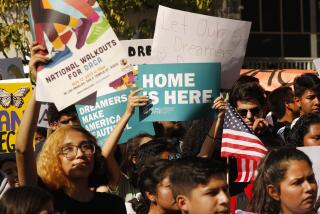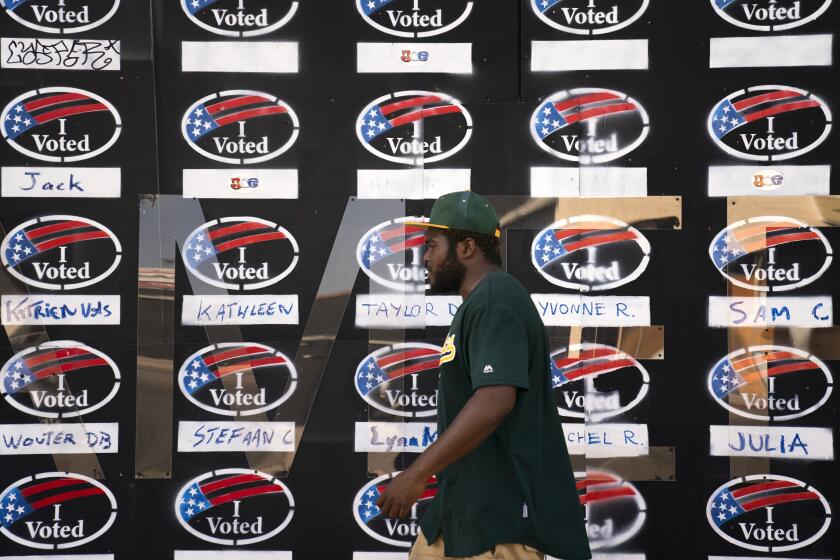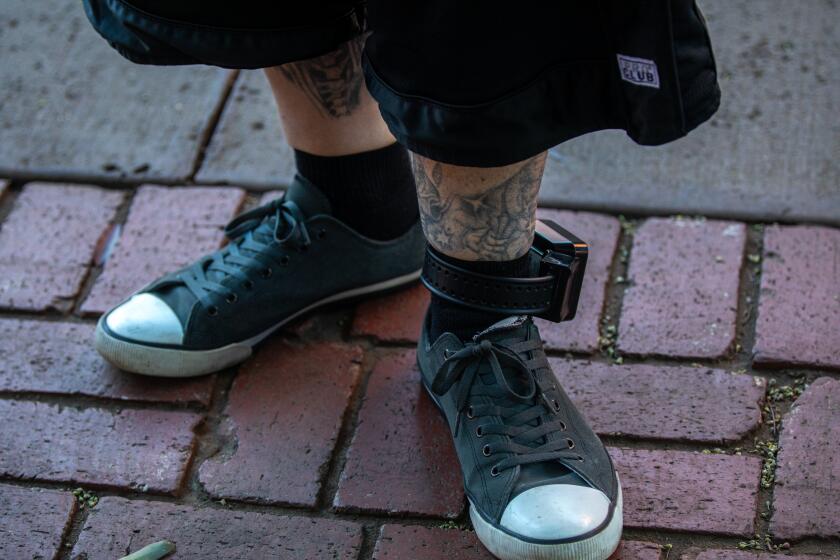Iranian students were accepted to U.S. schools. Then their visas were revoked without explanation
Sepideh was packing her suitcase for her move to California when a message from a friend popped up on her phone: Some Iranian students’ U.S. visas had abruptly been canceled. They couldn’t board their flights from Tehran to the United States.
The 23-year-old from Tehran had been accepted into a graduate program in computer science at UC Riverside. She was supposed to fly to Los Angeles at the beginning of September.
“I got really nervous,” said Sepideh, who like other students in this article asked that she be identified only by her first name. “I heard this could happen.”
Sepideh is one of about 20 Iranian students who had planned on starting graduate studies in fields such as computer science and engineering over the last few weeks to find their visas revoked by the U.S. government.
The students, the majority of whom were bound for University of California schools, said they received no explanation. University officials and Iranian American groups said they didn’t know what prompted the sudden change.
The visa cancellations come amid mounting political tensions between the Trump administration and Iran and the threat of military escalations in the Persian Gulf. Advocates say it’s unclear how the countries’ strained relations may factor into the visa cancellations.
“There’s been no transparency about what is happening, and so we’re left to wonder whether this is the result of the Muslim [travel] ban, extreme vetting or maximum pressure,” said Jamal Abdi, president of the National Iranian American Council.
Student visas are one of the few remaining gateways for Iranians to enter the United States. The Trump administration’s travel ban grants exceptions for F-1 visas.
Still, applicants go through more extensive background checks and vetting as a result of the ban, a process that experts say has delayed many applications for months.
The current iteration of the ban includes Iran, Libya, Somalia, Syria, Yemen, North Korea and Venezuela — countries that the U.S. government says fail to share information that would help it determine whether certain travelers could be involved in terrorism.
A congressional hearing on the travel ban Tuesday morning did not address issues concerning student visas. But Rep. Lee Zeldin (R-N.Y.) said exceptions to the ban were made and waivers were being granted on a case-by-case basis, citing Iranian student visas as an example.
A spokesperson for the State Department said the department cannot discuss the details of individual visa cases. There has been no change to policy regarding U.S. student visas, the spokesperson added, but “visa applicants are continuously screened, both at the time of their application and afterwards, to ensure they remain eligible to travel to the United States.”
In a statement, the University of California said it is “concerned that a number of our international students were recently unable to travel from Iran to the United States to pursue their educational opportunities.” The UC system said it is working with the State Department, U.S. Customs and Border Protection and others to seek answers.
Foreign students who also work as instructors and teaching assistants in the UC system are represented by the United Automobile Workers Local 2865.
“We are not surprised that the Trump administration has unfairly targeted our colleagues — we have stood with international members of our union through the travel bans and other racist policies,” Kavitha Iyengar, the local’s president, said in a statement. “But we will not tolerate it, either. We will use all the tools at our disposal to advocate for them and help them reenter the country.”
Most students learned of the latest shift when they showed up at airports in Tehran or other parts of the Middle East; at least one student was prevented in Boston from boarding a flight and was detained there.
When Sepideh checked her visa status online the day before her flight from Tehran, it was still marked as “issued.” But the page showed that there had been an update to her file at the end of August.
She talked to friends all night, trying to figure out what that meant. At 3 a.m., she made a desperate drive to Imam Khomeini International Airport in search of more information. Airline employees told her to come back three hours before her flight.
The next day, with her family by her side, Sepideh learned the check-in desk had received an email from U.S. officials saying that there was an issue with Sepideh’s visa and that she needed to contact the nearest embassy. She couldn’t fly to L.A., and the airline wouldn’t show her the message it received.
“I cried,” she said, her voice breaking. “I cry a lot.”
She made an appointment at the U.S. Embassy in Armenia, 700 miles away, for the following week. An official confirmed that her visa was canceled, she said, but told her she could reapply. She is waiting to see if she’s approved a second time. Because there is no U.S. Embassy in Iran, Iranians applying for non-immigrant visas visit embassies in Turkey and Armenia, or the U.S. Consulate General in Dubai.
“Last week, I was feeling very, very bad because my orientation was starting and I just kept thinking that I should have been there,” Sepideh said. “I had an apartment ready for me. I had plans. I would go on Instagram and I would see all my friends having fun.”
The U.S. government has placed restrictions on Iranian students for years. In 2012, an expansive law signed by President Obama denied Iranian citizens visas to study in the United States if they were preparing for careers in Iran’s energy or nuclear sectors.
State Department data show a steady decline in F-1 visas for Iranian students. Some 1,433 Iranians were granted F-1 visas in the 2018 fiscal year, compared with 3,280 in fiscal 2014.
Terry Hartle, senior vice president of the American Council on Education, said sudden visa cancellations are infrequent but not unprecedented. Hartle said he has heard of more problems with international student visas this year, pointing to the case of a Palestinian student who flew to Boston last month to attend Harvard but who was initially denied entry to the United States.
“It’s not clear whether there are in fact more [cases], or if we are much more in tune with it,” Hartle said.
California probably stands to benefit the most from foreign students, he added, because science and engineering are such a big part of the state’s economy.
“It’s in America’s interest to have foreign students come here,” he said. “They spend money. They contribute their knowledge and skills and perspectives and enterprise when they’re on campuses. They enrich discussion, and they leave with an understanding of democracy and market-based capitalism. The vast majority have such a good experience that they become really good ambassadors.”
Students grappling with the visa cancellations said they felt defeated. Some have applied for student visas a second time, while others wonder whether they should attend universities in other countries such as Canada.
Amin made it as far as Boston Logan International Airport before immigration officials pulled him out of line, saying that he had been randomly selected, he said.
Two officers opened his luggage and went through his cellphone and laptop, he said. He waited two hours before they came back and questioned him over photos he had on his phone in a military uniform. Military service is compulsory in Iran, he told the officers. They took him for further questioning, he said, and asked him questions he’d already answered in his visa interview.
“They said, ‘We need to take your answers to my boss,’” he recalled. “They came back with a ticket to Iran and said, ‘We decided you have to go to the embassy and we can’t allow you on our soil.’”
The 29-year-old had waited eight months to secure his visa and spent two years working and taking tests to get into American schools. He had been accepted into a program for mechanical engineering at the University of Toledo. But after an 18-hour flight to Boston, he was escorted onto a flight back to Tehran. His application for a second visa was rejected.
“I know my situation won’t change, and I don’t have any hope that I could get my visa and return as a PhD student,” he said. “They don’t care that they’re smashing two years of someone’s life under their feet and shattering them.”
Narges, 23, who was admitted to a doctorate program in computer science at UC Riverside, said that her family has spent nearly $10,000 on trips to and from the embassy in Armenia, university applications and a flight to the United States.
Narges said she spoke with UC officials, who have allowed her to defer her admission to the winter term while she tries to secure another visa. When she returned to the embassy in Yerevan, the Armenian capital, on Monday, an officer told her that they didn’t know why her visa was revoked and that there was nothing negative in her profile.
Like other students, she had been awarded a fellowship for her first year of study and was planning on working as a teaching assistant or research assistant in the following years.
“I can’t believe this whole thing has happened,” Narges said. “I couldn’t believe that some had gone to the airport and then gone back to their houses. The whole thing was so unexpected.”
The students have put together a spreadsheet to keep track of their cases and determine whether they all had something in common that would bar them from the U.S., she said.
The only thing they found, she said, was that they are all Iranian.
Times staff writer Teresa Watanabe contributed to this report.
More to Read
Sign up for Essential California
The most important California stories and recommendations in your inbox every morning.
You may occasionally receive promotional content from the Los Angeles Times.











